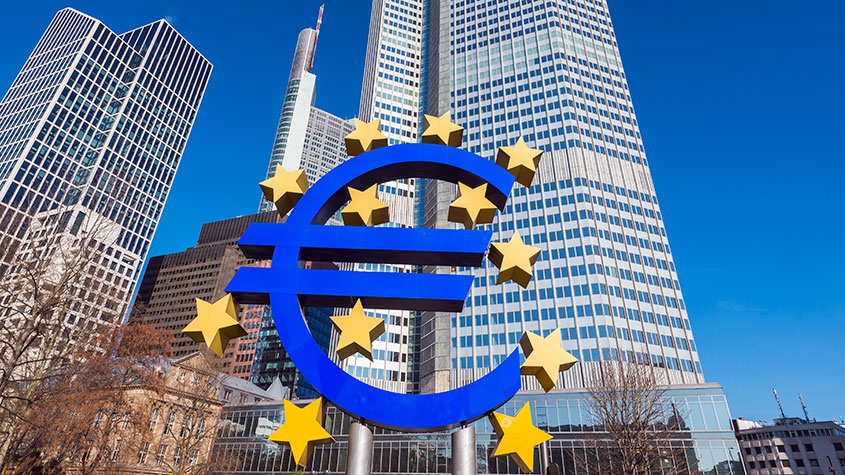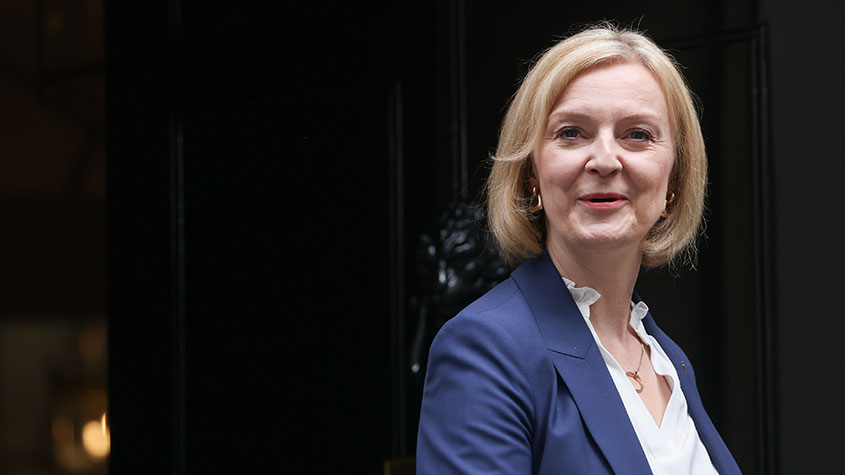How Brexit will save the United Kingdom
Leaving the EU should strengthen the United Kingdom – a multinational union Europe can only aspire to. Alex Carew, a London-based fund manager and economic historian, explains how.
Get the latest financial news, insights and expert analysis from our award-winning MoneyWeek team, to help you understand what really matters when it comes to your finances.
You are now subscribed
Your newsletter sign-up was successful
Want to add more newsletters?

Twice daily
MoneyWeek
Get the latest financial news, insights and expert analysis from our award-winning MoneyWeek team, to help you understand what really matters when it comes to your finances.

Four times a week
Look After My Bills
Sign up to our free money-saving newsletter, filled with the latest news and expert advice to help you find the best tips and deals for managing your bills. Start saving today!

It's on the rocks. Again. Like all marriages, the union between Scotland and England has had its ups and downs. Along with Northern Ireland, Scotland voted to Remain in the 2016 referendum on our membership of the European Union; England and Wales voted to Leave. Brexit is a lever Nicola Sturgeon and the Scottish National Party hope will prise Scotland out of the UK. The current chaos at Westminster isn't exactly an inducement to stay. Who wouldn't want a divorce from our political establishment?
Present political anarchy aside, however, Brexit could be just the aphrodisiac Scotland and England's marriage could use and not just because Brexit is a sobering reminder of the often appalling costs of divorce. After all, if you think that leaving the European Union after 40-plus years of membership has been bitter and damaging, imagine dissolving a far more complex, centuries-old marriage. Irish border problem? I'll raise you a hard border across Great Britain and breaking up a currency union. Nor is it that Scottish independence outside the EU's increasingly harmonised structures would be a considerably less practical undertaking, as the UK and Scotland wouldn't automatically operate with the same rules.
Instead, all of us who believe in the United Kingdom should use Brexit as an opportunity to focus on what makes multinational unions work because doing so highlights just how remarkable the UK actually is.
MoneyWeek
Subscribe to MoneyWeek today and get your first six magazine issues absolutely FREE

Sign up to Money Morning
Don't miss the latest investment and personal finances news, market analysis, plus money-saving tips with our free twice-daily newsletter
Don't miss the latest investment and personal finances news, market analysis, plus money-saving tips with our free twice-daily newsletter
What makes a successful multinational union?
Here are some essential ingredients for a successful, sovereign multinational union: an effective single currency covering a highly integrated economic area, along with fiscal risk-sharing and wealth redistribution across that area (such as the Barnett formula governing public spending in Scotland, Wales and Northern Ireland). A comprehensive single market in goods and services is also a key requirement. Then you need a single, risk-free sovereign debt market; a banking union; a united foreign, security and defence policy; deep cultural and family ties; shared values; unlimited, uncontentious free movement of people; representative institutions with real power and (usually) popular legitimacy; a shared head of state; and similar legal traditions. A shared mother tongue is useful, too.
Tennis legend Roger Federer makes winning Grand Slams look so relaxed, it's easy to forget the experience, training and skill required. Similarly, the UK makes being a multinational union look almost effortless. We certainly have our problems, not least the lopsided constitutional settlement bequeathed by New Labour in the late 1990s. But it is worth appreciating that the UK's areas of greatest strength are often those of existential peril for the EU.
Why the eurozone isn't one
Take the eurozone. Lacking a shared sovereign debt instrument and the substantial budget and fiscal transfers required for long-term survival, the single currency remains perilously exposed to future economic and market shocks. How about freedom of movement? Hardly uncontentious across the bloc. Or the varied and frequently contradictory foreign-policy objectives of diverse member states? Regrettably, the list goes on.
By contrast, Scotland would be leaving a union that "has it all". The United Kingdom has withstood all that history can throw at it. Within it Scotland not only has a seat at every top table, but it also wields outsize influence. Scotland has produced six of the 23 individual British prime ministers since 1900. Not bad for a nation with about 8% of the population. And it's a Scot we have to thank for saving us from the euro: take a bow, Gordon Brown. Will Scotland produce a quarter of the EU's top brass, where its population and economy would simply be a rounding error?
Swapping a solid union for a flimsy one
SNP policy is to ditch this trusted familial relationship in favour of what even the most ardent federalist will admit is a structurally flawed union struggling to replicate the UK. And Scotland would have negligible influence to boot.
As the Remain operation found out to its cost, however, campaigns overly focused on practicalities struggle to gain traction in a post-technocratic era that craves narrative. Human beings are not simply sentient econometric calculators. We prize identity, family, roots, values and purpose. The desiccated, post-Cold War liberal order has little to offer here beyond the culture of the atomised self, and is consequently everywhere in retreat.
Predicting the UK's dissolution, a Financial Times columnist recently opined that "Britishness is an invented identity". My own Anglo-Scottish family suggests otherwise. My grandfather and his forebears hailed from Glasgow and the West Coast. They fought and lived under the Union flag, and were no less Scottish for it. My surname is originally Welsh, via Ireland and the West Country. Like millions of other Britons, I am a product of all the home nations; avowedly not ethno-nationalist, and distinctly British, thank you very much. It is this marriage of family, friendship, practicality, sacrifice and values that should leave the UK well placed to survive the 21st century's identitarian onslaught.
The Reformation: the first Brexit
What of those values? "Protestantism was the foundation that made the invention of Great Britain possible," noted historian Linda Colley. When Elizabeth I died childless in 1603, it was her cousin and fellow Protestant, James VI of Scotland, who acceded to the English throne as James I. This we can consider Union 1.0, or the "personal union", founded in a shared rejection of restrictive continental orthodoxies and remote, unaccountable power. Sound familiar? One regal head wore two separate crowns. It took another century and several failed attempts to bring about a formal parliamentary merger with the Acts of Union in 1706/1707, or Union 2.0. Peace and strategic security succeeded war and uneasy co-existence. United, Scotland and England were free to focus their energies commercial, political, military outward, rather than inward. And united, of course, is what the EU would love to be yet its inherent structural flaws will continue to frustrate this ambition.
Take back control then give it to Europe?
The present tide of anti-establishment politics sweeping the West has much in common with the Reformation 500 years ago. Substitute "internet" for "printing press" and "EU" for "Catholic Church" and you get the picture. This analogy also applies because, as Professor Brendan Simms of the University of Cambridge points out, whatever your views on the decision itself, asking Theresa May and the civil service to carry out Brexit is like asking the cardinals to carry out the Reformation. Unsurprisingly, it's an unholy mess.
More fundamentally, the comparison is resonant because Scotland and the other British home nations share a deep tradition of freedom and a mistrust of remote, centralised, unaccountable power. This is, after all, the core of the SNP's message. Take back control (but then give it away to the EU). It's also the message of Brexit, which the SNP of all people should have seen coming. The strong Yes/Leave showing in the 2014 independence referendum for what had hitherto been a minority pursuit was the canary in the populist coalmine, driven by a sense of alienation from an increasingly remote technocratic elite.
A tonic for the UK
So Brexit's a potential tonic for the United Kingdom in at least three respects. Firstly, for all its imperfections, the UK has long been the flagship multinational sovereign union that the EU aspires to be. Whatever one's views on Brexit, the EU's continuing struggle to create something similar should make us grateful for what the UK already is, and to make the case for it with renewed energy. Secondly, divorces are brutal and are not to be undertaken lightly. That's doubly true when, behind the noise, the fundamentals of the marriage remain strong. And triply true when the divisions over key questions are narrow (both referendum results were very close).
Finally, the original Reformation made the UK possible. Britons on both sides of the border share similar values: SNP supporters and Brexiteers have more in common than either might care to admit. With the right leadership, the new Reformation spirit can re-energise the Union for the 21st century with a narrative that appeals to Brexiteers, Scottish nationalists and Remainers too. Take back control from remote, unaccountable authority. Refocus on the things that really matter: family, community, way of life and shared values. Where power does not need to be wielded centrally, push it down. In an era of vicious identity politics and resurgent ethno-nationalism, the multinational concept of Britishness is more valuable than ever before. And as the moving scenes in Hong Kong remind us where pro-democracy protesters wave the Union flag as a symbol of freedom and defiance the rest of the world knows what the Union stands for. It's time we remembered too.
Get the latest financial news, insights and expert analysis from our award-winning MoneyWeek team, to help you understand what really matters when it comes to your finances.
-
 Last chance to invest in VCTs? Here's what you need to know
Last chance to invest in VCTs? Here's what you need to knowInvestors have pumped millions more into Venture Capital Trusts (VCTS) so far this tax year, but time is running out to take advantage of tax perks from them.
-
 ISA quiz: How much do you know about the tax wrapper?
ISA quiz: How much do you know about the tax wrapper?Quiz One of the most efficient ways to keep your savings or investments free from tax is by putting them in an Individual Savings Account (ISA). How much do you know about ISAs?
-
 No peace dividend in Trump's Ukraine plan
No peace dividend in Trump's Ukraine planOpinion An end to fighting in Ukraine will hurt defence shares in the short term, but the boom is likely to continue given US isolationism, says Matthew Lynn
-
 Europe’s new single stock market is no panacea
Europe’s new single stock market is no panaceaOpinion It is hard to see how a single European stock exchange will fix anything. Friedrich Merz is trying his hand at a failed strategy, says Matthew Lynn
-
 Britain’s inflation problem
Britain’s inflation problemInflation in the UK appears to be remaining higher for longer when compared with similar rich countries. Why? And when can we expect a return to normal? Simon Wilson reports.
-
 Eurozone inflation hits 10.7% in October
Eurozone inflation hits 10.7% in OctoberNews Inflation across the eurozone hit 10.7% in October. What does it mean for your money?
-
 A forgotten lesson on the dangers of energy price caps
A forgotten lesson on the dangers of energy price capsAnalysis Liz Truss’s proposed energy price cap is an ambitious gamble. But a similar programme in Spain ended up being a fiasco, say Max King and Tom Murley. Here, they explain why Truss’s plan could be doomed to failure.
-
 Don't be scared by economic forecasting
Don't be scared by economic forecastingEditor's letter The Bank of England warned last week the UK will tip into recession this year. But predictions about stockmarkets, earnings or macroeconomic trends can be safely ignored, says Andrew Van Sickle.
-
 The wolf returns to the eurozone’s door
The wolf returns to the eurozone’s doorEditor's letter The eurozone’s intrinsic flaws have been exposed again as investors’ fears about Italy’s ability to pay its debt sends bond yields soaring.
-
 Eurozone economy heads for paralysis
Eurozone economy heads for paralysisNews Record high energy prices, the threat of recession in Germany and squabbling in Italy's government has left the eurozone fighting fires on all fronts.